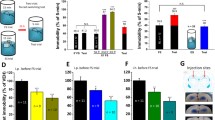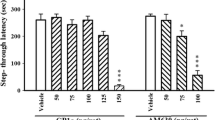Abstract
Rationale
NMDA-R (N-methyl-d-aspartate receptors) have been implicated in synaptic plasticity underlying one-trial learning of event-place associations. In rodents, episodic-like memory (ELM) of personally experienced events can be inferred from behavior that reflects the remembrance of the content (what kind of object was presented), place (where was this object placed), and temporal context (when was the object presented). We have previously shown that that d-cycloserine (DCS), an NMDA-R agonist, ameliorates stress-induced deficits in ELM.
Objectives
In this study, we used an experimental protocol designed to detect promnestic drug effects and investigated whether DCS, which is known to enhance learning and memory, can induce ELM under conditions where mice normally do not show ELM.
Results
Mice that have been treated i.p. with DCS (20 mg/kg) both remembered the temporal order in which two different objects had been encountered during two consecutive sample trials, as well as their spatial position during the sample trials. Most importantly, the test trial performance of these mice is compatible with ELM in terms of an integrated memory for unique experiences comprising “what”, “where”, and “when” information. In contrast, mice that have received either a saline injection or lower doses of DCS (0.2 and 2.0 mg/kg) did not show such an integrated ELM.
Conclusions
To our knowledge, this is the first report showing that DCS can promote ELM in mice.


Similar content being viewed by others
References
Baxter MG, Lanthorn H, Frick KM, Golski S, Wan RQ, Olton DS (1994) d-Cycloserine, a novel cognitive enhancer, improves spatial memory in aged rats. Neurobiol Aging 15:207–213
Blank H (2002) The role of horizontal categorization in retroactive and proactive interference. Exp Psychol 49:196–207
Bower GH, Thompson-Schill S, Tulving E (1994) Reducing retroactive interference: an interference analysis. J Exp Psychol Learn Mem Cogn 20:51–66
Butterfield DA, Pocernich CB (2003) The glutamatergic system and Alzheimer’s disease: therapeutic implications. CNS Drugs 17:641–652
Dere E, Huston JP, De Souza Silva MA (2005a) Integrated memory for objects, places and temporal order: evidence for episodic-like memory in mice. Neurobiol Learn Mem 84:214–221
Dere E, Huston JP, De Souza Silva MA (2005b) Protocol: episodic-like memory in mice: simultaneous assessment of object, place and temporal order memory. Brain Res Protoc 16:10–19
Dere E, Huston JP, De Souza Silva MA (2007) The pharmacology, neuroanatomy, and neurogenetics of one-trial object recognition in rodents. Neurosci Biobehav Rev 31:673–704
Dere E, Kart-Teke E, Huston JP, De Souza Silva MA (2006) The case for episodic memory in animals. Neurosci Biobehav Rev 30:1206–1224
Dingledine R, Borges K, Bowie D, Traynelis SF (1999) The glutamate receptor ion channels. Pharmacol Rev 51:7–61
Han JS, Gallagher M, Holland P (1998) Hippocampal lesions enhance configural learning by reducing proactive interference. Hippocampus 8:138–146
Johnson JW, Ascher P (1987) Glycine potentiates the NMDA response in cultured mouse brain neurons. Nature 325:529–531
Kart-Teke E, De Souza Silva MA, Huston JP, Dere E (2006a) Wistar rats show episodic-like memory for unique experiences. Neurobiol Learn Mem 85:173–182
Kart-Teke E, Dere E, Huston JP, De Souza Silva MA (2006b) Reinstatement of episodic-like memory in rats by NK-1 receptor antagonism. Neurobiol Learn Mem 87:324–331
Land C, Riccio DC (1999) d-Cycloserine: effects on long-term retention of a conditioned response and on memory for contextual attributes. Neurobiol Learn Mem 72:158–168
Li JS, Chao YS (2007) Dorsal hippocampal CA3 lesions impair episodic-like memory in rats. Annual meeting of the International Behavioral Neuroscience Society (IBNS), Rio de Janeiro, 12–16 June 2007
Loscher W, Wlaz P, Rundfeldt C, Baran H, Honack D (1994) Anticonvulsant effects of the glycine/NMDA receptor ligands d-cycloserine and d-serine but not R-(+)-HA-966 in amygdala-kindled rats. Br J Pharmacol 112:97–106
Lynch MA (2004) Long-term potentiation and memory. Physiol Rev 84:87–136
Manns JR, Eichenbaum H (2006) Evolution of declarative memory. Hippocampus 16:795–808
Morris RGM (2006) Elements of a neurobiological theory of hippocampal function: the role of synaptic plasticity, synaptic tagging and schemas. Eur J Neurosci 23:2829–2846
Mumby DG, Gaskin S, Glenn MJ, Schramek TE, Lehmann H (2002) Hippocampal damage and exploratory preferences in rats, memory for objects, places, and contexts. Learn Mem 9:49–57
Ohno M, Watanabe S (1996) d-Cycloserine, a glycine site agonist, reverses working memory failure by hippocampal muscarinic receptor blockade in rats. Eur J Pharmacol 318:267–271
Pussinen R, Sirvio J (1999) Effects of d-cycloserine, a positive modulator of N-methyl-D-aspartate receptors, and ST 587, a putative alpha-1 adrenergic agonist, individually and in combination, on the non-delayed and delayed foraging behaviour of rats assessed in the radial arm maze. J Psychopharmacol 13:171–179
Randolph C, Roberts JW, Tierney MC, Bravi D, Mouradian MM, Chase TN (1994) d-Cycloserine treatment of Alzheimer disease. Alzheimer Dis Assoc Disord 8:198–205
Riekkinen P, Ikonen S, Riekkinen M (1998) d-Cycloserine, a partial NMDA receptor-associated glycine-B site agonist, enhances reversal learning, but a cholinesterase inhibitor and nicotine has no effect. Neuroreport 9:3647–3651
Roberts WA (2002) Are animals stuck in time? Psych Bull 128:473–489
Rouaud E, Billard JM (2003) d-Cycloserine facilitates synaptic plasticity but impairs glutamatergic neurotransmission in rat hippocampal slices. Br J Pharmacol 140:1051–1056
Schuster GM, Schmidt WJ (1992) d-Cycloserine reverses the working memory impairment of hippocampal-lesioned rats in a spatial learning task. Eur J Pharmacol 224:97–98
Schwartz BL, Hashtroudi S, Herting RL, Schwartz P, Deutsch SI (1996) d-Cycloserine enhances implicit memory in Alzheimer patients. Neurology 46:420–424
Small BJ, Mobly JL, Laukka EJ, Jones S, Backman L (2003) Cognitive deficits in preclinical Alzheimer’s disease. Acta Neurol Scand 179:29–33
Tang YP, Shimiizu E, Dube GR, Rampon C, Kerchner GA, Zhuo M, Liu G, Tsien JZ (1999) Genetic enhancement of learning and memory in mice. Nature 401:63–69
Tsai GE, Falk WE, Gunther J, Coyle JT (1999) Improved cognition in Alzheimer's disease with short-term d-cycloserine treatment. Am J Psychol 156:467–469
Acknowledgment
This work was supported by the Deutsche Forschungsgemeinschaft (DFG) through grant no. DE 1149/1-2 to ED.
Author information
Authors and Affiliations
Corresponding author
Rights and permissions
About this article
Cite this article
Zlomuzica, A., De Souza Silva, M.A., Huston, J.P. et al. NMDA receptor modulation by d-cycloserine promotes episodic-like memory in mice. Psychopharmacology 193, 503–509 (2007). https://doi.org/10.1007/s00213-007-0816-x
Received:
Accepted:
Published:
Issue Date:
DOI: https://doi.org/10.1007/s00213-007-0816-x




